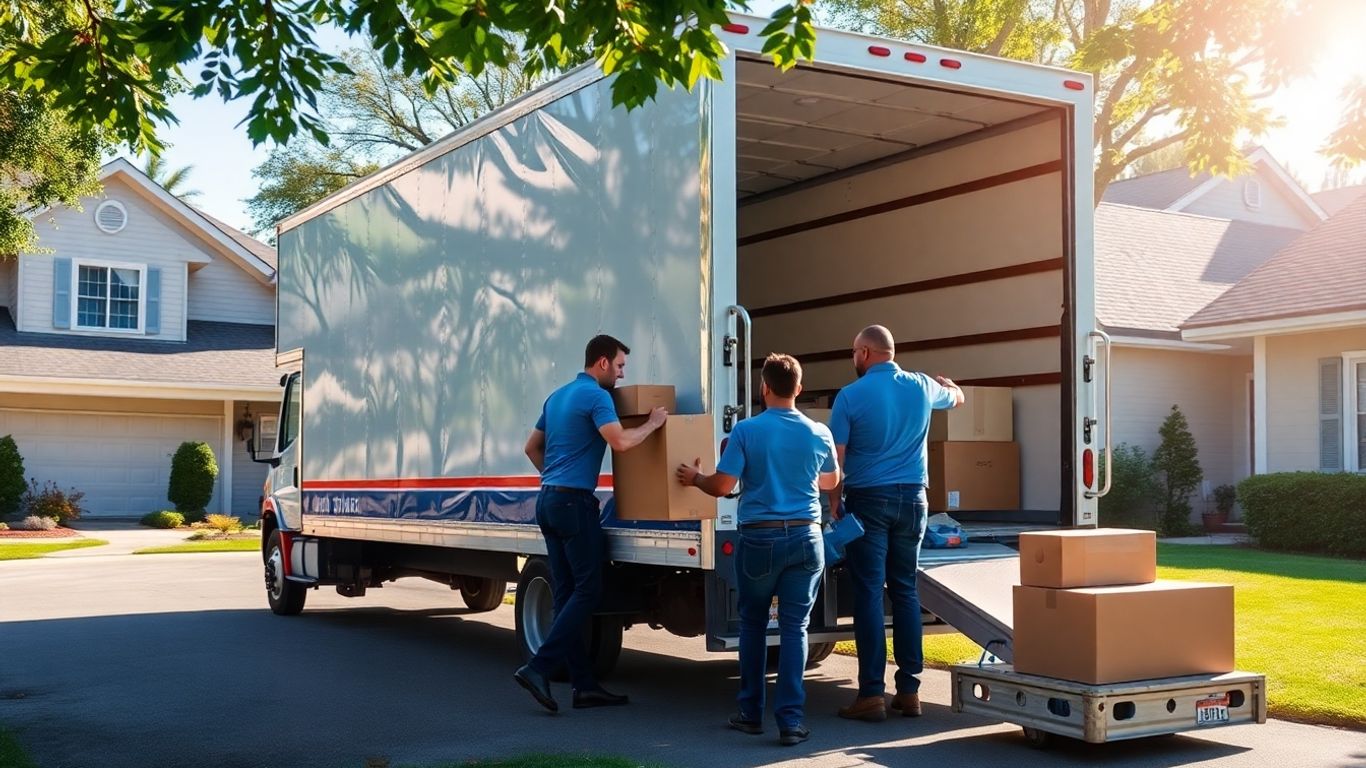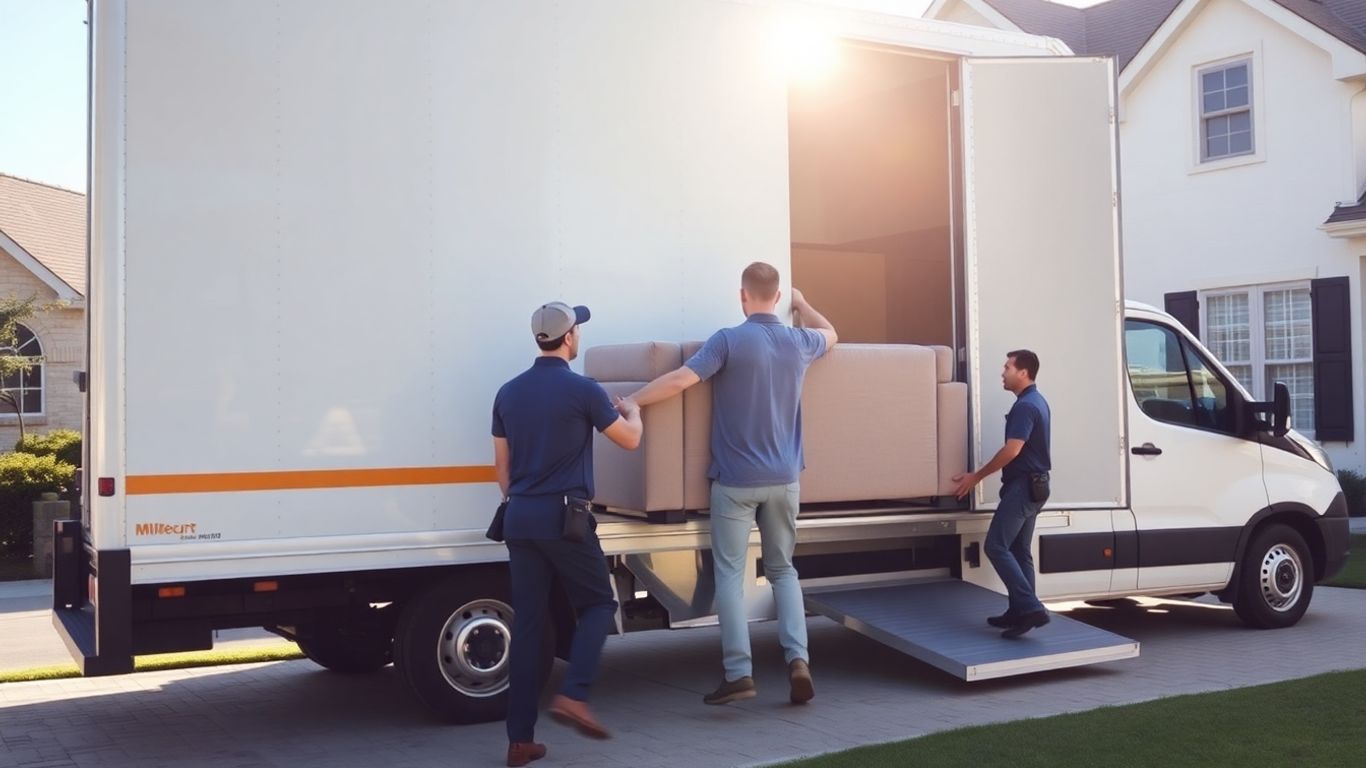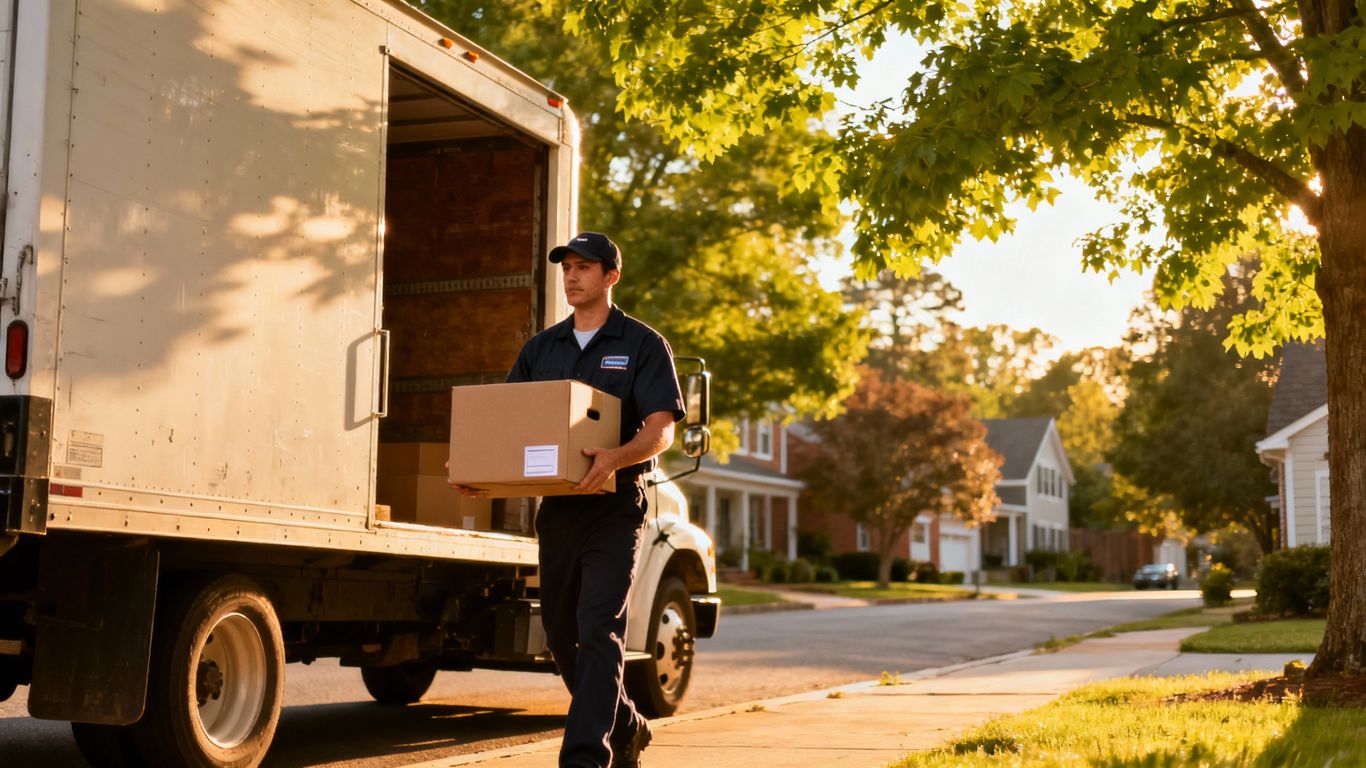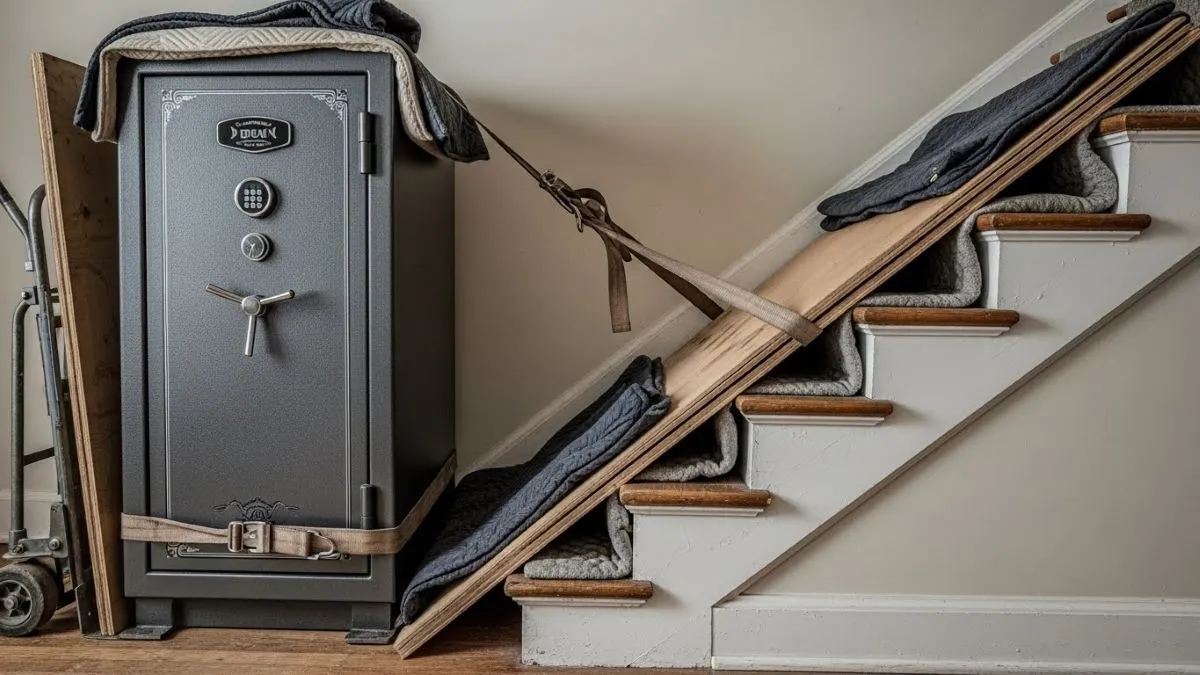How to Find Licensed Movers in Virginia: A Step-by-Step Guide
Moving can be a real pain, right? Especially when you're trying to do it in a new state like Virginia. You want to make sure your stuff gets there in one piece and that you're not getting ripped off. So, how do you find movers in Virginia that are actually legit and won't cause you more stress? It takes a bit of digging, but it's totally doable. This guide will walk you through how to find licensed movers in Virginia, step-by-step.
Key Takeaways
- Always check online reviews and ratings from past customers to get a feel for a moving company's reliability.
- Verify that movers are properly licensed and insured; this is non-negotiable, especially for longer moves.
- Get quotes from multiple companies and compare not just the price, but also what services are included.
- Understand the different insurance options available to protect your belongings during the move.
- Don't hesitate to ask friends and family for recommendations; word-of-mouth can point you to trustworthy movers.
Researching Potential Moving Companies

So, you've decided to move, and now comes the part where you need to find someone to actually help you get your stuff from point A to point B. It can feel a bit overwhelming with so many companies out there, right? The key is to do your homework before you commit to anyone. This isn't just about finding the cheapest option; it's about finding a company that's reliable, professional, and will treat your belongings with care.
Checking Online Reviews and Ratings
Nowadays, the internet is usually the first place we look for anything, and moving companies are no exception. Websites like Google Reviews, Yelp, and even the Better Business Bureau (BBB) can give you a good starting point. When you're looking at reviews, don't just glance at the star ratings. Take a few minutes to read what people are actually saying. Are they mentioning punctuality? How the movers handled fragile items? Were there any surprise charges? A company with a lot of recent, positive feedback about careful handling and on-time arrivals is usually a good sign. On the flip side, watch out for patterns of complaints about damage or poor communication.
Verifying Credentials and Licensing
This is super important, especially if you're moving across state lines. In Virginia, movers are generally required to be licensed. For interstate moves, you'll want to make sure they're registered with the U.S. Department of Transportation (DOT). You can usually find this information on their website, or you can just ask them directly. A legitimate company won't hesitate to provide their license or DOT number. It shows they're operating legally and have met certain standards. Don't be shy about asking for this proof – it's your right as a consumer.
Assessing Company Experience
How long has the company been in business? While a newer company might be great, an established one often has a proven track record. Ask them about their experience, especially with moves similar to yours. If you have a lot of antique furniture or particularly heavy items, you'll want to know if they have experience handling those specific things. A company that's been around for a while and can share details about their history and how they handle different types of moves is usually a safer bet. They've likely encountered and solved many moving challenges before.
Finding the right mover is like picking a good contractor for your house – you want someone you can trust with something important. Taking the time to research upfront can save you a lot of headaches later on.
Understanding Moving Quotes and Costs
Getting a clear picture of what you'll pay is a big part of picking the right movers. It's not just about the bottom line; it's about knowing exactly what you're paying for.
Requesting and Comparing Multiple Quotes
Don't just go with the first company that gives you a price. It's really smart to get quotes from at least three different moving companies. When you ask for a quote, be ready to give them all the details. This includes the size of your place, how many rooms you're moving, and if you have any big or awkward items like a piano or a safe. Also, let them know your moving date, as prices can change depending on the season or if it's a weekend.
- Provide accurate details: The more information you give, the more accurate the quote will be.
- Ask for an in-home estimate: While phone or online estimates are quick, an in-home visit usually gives you the most precise price.
- Compare apples to apples: Make sure you're comparing quotes for the same services.
Identifying Potential Hidden Fees
This is where things can get tricky. Some moving companies might seem cheaper at first, but then surprise you with extra charges on moving day. Always ask about potential extra fees. These can include things like:
- Stairs: If you have multiple flights of stairs, expect a potential extra charge.
- Long Carry: If the moving truck can't park right outside your door, they might charge for carrying your items a longer distance.
- Bulky Items: Large or heavy items, like a grand piano or a large safe, often come with a special handling fee.
- Packing Materials: Unless specified, the cost of boxes, tape, and bubble wrap might not be included.
Always get a written estimate that clearly lists all potential charges. If something isn't clear, ask for clarification before you sign anything. It's better to know upfront than to be shocked later.
Evaluating Services Included in Pricing
When you're looking at those quotes, don't just focus on the total cost. Take a good look at what each company includes. Some companies might have a slightly higher price but offer more services, which could actually save you time and hassle. Think about whether you need packing help, furniture disassembly and reassembly, or even temporary storage. A company that includes these services might be a better deal overall, even if the initial price tag is a bit higher. It's about finding the best value for your specific moving needs.
Ensuring Protection Through Insurance
When you're moving, the last thing you want to worry about is your stuff getting damaged. That's where insurance comes in. It's like a safety net for your belongings during the chaos of a move. You've got a few options, and it's smart to know what they are before you sign anything.
Understanding Basic Coverage Options
Most moving companies offer a basic level of protection, often called Released Value Protection. This is usually included in the price of your move, which sounds good, right? But here's the catch: it's not exactly robust. It typically covers your belongings at a rate of $0.60 per pound per item. So, if your 50-pound TV gets damaged, you might only get $30 back. It's better than nothing, but it probably won't cover the actual cost of replacing a damaged item. It's important to understand that this is not true insurance, but rather a limitation of the mover's liability. You can find more details on what movers must provide on the Virginia Department of Motor Vehicles website.
Exploring Full Value Protection
If Released Value Protection sounds a bit too light for your needs, you'll want to look into Full Value Protection. This is a more comprehensive option. With Full Value Protection, the moving company is responsible for the replacement value of any lost or damaged items. If something breaks, they'll either repair it, replace it, or give you a cash settlement for its current market value. This coverage usually costs extra, and the price can vary depending on the total declared value of your shipment. It's definitely worth considering if you have a lot of valuable or fragile items.
Considering Additional Insurance Policies
Sometimes, even Full Value Protection might not be enough, especially if you have extremely valuable items like artwork or antiques. In these cases, you might want to explore third-party insurance policies. These are separate policies you can purchase from an insurance provider that specialize in moving insurance. They can offer higher limits and broader coverage than what a moving company might provide. It's a good idea to compare quotes from different insurance providers to find the best policy for your specific situation.
It's really important to read the fine print on any insurance or protection plan offered by a moving company. Don't just assume you're covered for everything. Ask questions, get everything in writing, and make sure you're comfortable with the level of protection before your move day arrives. A little bit of effort now can save you a lot of headaches later.
Here's a quick rundown of what to ask about:
- What is the cost of Full Value Protection?
- What is the deductible, if any?
- What is the process for filing a claim?
- Are there any exclusions for certain types of items?
- What documentation do I need to provide if an item is damaged?
Evaluating the Services Offered by Movers

So, you've got a list of potential movers, and you're starting to compare them. That's great! But before you just pick the one with the lowest price, let's talk about what they actually do. Not all moving companies are created equal, and the services they provide can make a huge difference in how smooth your move goes.
Assessing Specific Moving Needs
First things first, you gotta know what you need. Think about your stuff. Do you have a ton of furniture that needs to be taken apart and put back together? Maybe you've got a grand piano or some really old, delicate artwork. Or perhaps you're moving a lot of boxes and just need the heavy lifting done. Pinpointing your specific needs is the first step to finding the right mover. It's like making a grocery list before you go to the store – you know what you're looking for.
Here are some things to consider about your move:
- Packing: Are you going to pack everything yourself, or do you want the movers to handle it? Some companies offer full packing services, while others might only pack fragile items.
- Disassembly/Reassembly: For big items like beds, tables, or entertainment centers, do you need help taking them apart and putting them back together at your new place?
- Special Items: Do you have anything unusual or particularly valuable, like a safe, a pool table, or a collection of antique china?
- Storage: Is there a gap between when you have to leave your old place and when you can get into your new one? Some movers offer temporary storage solutions.
Confirming Availability of Necessary Services
Once you know what you need, it's time to see if the movers you're looking at actually offer it. Don't assume! A company might be great at local moves but not so much with long-distance ones, or they might not have the right equipment for handling heavy items. Always ask directly. You can usually find this information on their website, but a quick phone call is often the best way to get a clear answer.
Here's a quick rundown of common services to inquire about:
- Packing and Unpacking: This can save you a ton of time and stress. Ask about the materials they use and if they offer full or partial packing.
- Furniture Disassembly and Assembly: This is super helpful for large or complex furniture. Make sure they have the right tools and know-how.
- Specialty Item Handling: If you have pianos, artwork, or other delicate items, confirm they have specific procedures and trained staff for these.
- Temporary Storage: If you need a place to stash your belongings for a short period, check if they have storage options and what the costs are.
It's easy to get caught up in the price when comparing moving companies. But remember, the cheapest option isn't always the best. Sometimes, paying a little more for a company that offers the exact services you need can save you a lot of headaches and potential damage down the line. Think about what's most important to you – saving money, saving time, or having peace of mind that your belongings are handled with care.
Finding Reliable Movers in Virginia
So, you're looking to move in or out of Virginia, huh? It can feel like a big task, but finding the right help makes all the difference. It’s not just about picking the first company you see online; it’s about doing a little homework to make sure your stuff gets where it needs to go without a hitch.
Seeking Word-of-Mouth Recommendations
Honestly, sometimes the best way to find a good mover is to ask around. Chat with friends, family, or coworkers who have moved recently in the area. They might have firsthand experience with companies that did a great job – or ones to steer clear of. Personal recommendations can be super helpful because they come from people you trust. You can also check local community groups online; people often share their moving experiences there.
Utilizing Online Search Platforms
When you start searching online, don't just go for the top ad. Look at review sites like Google or Yelp. See what past customers are saying about punctuality, how careful the movers were with belongings, and the overall service. Pay attention to recurring themes in reviews, both good and bad. It’s also a good idea to check out the Better Business Bureau (BBB) for ratings and any complaints filed against a company. For a list of highly-rated companies, you can check out resources that specifically rank moving companies in Virginia.
Confirming Licensing and Insurance Status
This is a big one. Before you sign anything, you absolutely need to confirm that the moving company is properly licensed and insured. For moves within Virginia, they should have a state license. For long-distance moves, they'll need a USDOT number from the Federal Motor Carrier Safety Administration (FMCSA). You can usually find this information on their website, or you can just ask them directly. It’s also important to understand their insurance policies. What happens if something gets damaged? Make sure you know what basic coverage is included and what your options are for additional protection. It’s better to be safe than sorry when it comes to your belongings.
Moving is stressful enough without worrying about whether your movers are legit. Taking a few extra steps to verify their credentials and insurance can save you a lot of headaches down the road. It’s about peace of mind, knowing your possessions are in capable hands.
Here’s a quick rundown of what to look for:
- License Verification: Check for a Virginia state license or a USDOT number for interstate moves.
- Insurance Details: Understand the basic coverage and inquire about options like Full Value Protection.
- Company History: Look into how long they've been in business and their reputation.
- Quote Comparison: Always get multiple quotes and compare them carefully, looking beyond just the price.
Looking for movers in Virginia? It's important to find a moving company you can trust. We make moving easy and stress-free. Let us handle the heavy lifting so you can focus on settling into your new home. Visit our website today to learn more about our services and get a free quote!
Wrapping Up Your Virginia Move
So, finding licensed movers in Virginia might seem like a big task, but it's totally doable. Remember to check reviews, look into their licenses and insurance, and always get a few quotes before you decide. Don't just go for the cheapest option; make sure they seem reliable and have a good track record. Taking these steps will help make sure your belongings get to your new place safely and without too many headaches. Happy moving!
Frequently Asked Questions
How do I know if a moving company in Virginia is legit?
To make sure a moving company is legit, check if they have a license. You can usually find this info on their website or by asking them directly. Also, look them up on the Better Business Bureau (BBB) website to see their rating and if people have complained. A licensed and well-rated company is usually a safe bet.
What's the best way to compare moving company prices?
Don't just pick the cheapest one! Get price quotes from at least three different companies. Make sure you tell them all the same details about your move. Then, compare not just the price, but also what services are included. Some might seem cheaper but charge extra for things you need.
Are there hidden fees I should watch out for?
Yes, definitely! Moving companies might charge extra for things like carrying items up stairs, long walks from the truck to your door, or moving big, heavy furniture. Always ask about these potential extra costs before you agree to anything.
What kind of insurance do movers offer?
Movers usually offer basic coverage called 'Released Value Protection.' This is super cheap but doesn't cover much – just a few cents per pound of your stuff. For better protection, you can pay extra for 'Full Value Protection,' which covers the cost to repair or replace damaged items. Always ask what each option means.
Do I need to do anything special for long-distance moves in Virginia?
For long-distance moves, it's extra important that the company is licensed by the federal government (look for a USDOT number). They have stricter rules to follow. Also, get quotes from companies that specialize in longer moves, as they handle the logistics differently.
Besides online reviews, how can I find good movers?
Ask people you trust! Friends, family, or coworkers who have moved recently might have great recommendations. Word-of-mouth is often the most reliable way to find a moving company that does a good job and treats your belongings well.












